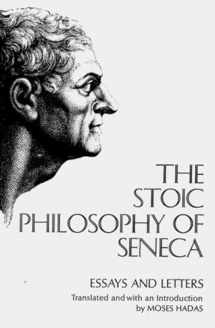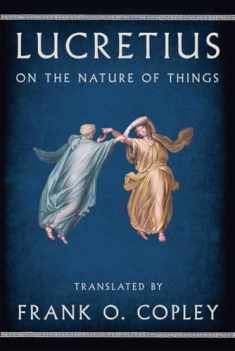
Stoic Philosophy of Seneca: Essays and Letters
ISBN-13:
9780393004595
ISBN-10:
0393004597
Author:
Lucius Annaeus Seneca
Publication date:
1968
Publisher:
W. W. Norton & Company
Format:
Paperback
261 pages
Category:
Greek & Roman
,
Philosophy
,
Medieval Thought
FREE US shipping
on ALL non-marketplace orders
Marketplace
from $15.59
USD
Marketplace offers
Seller
Condition
Note
Seller
Condition
New
Brand New! Not overstocks! Brand New direct from the publisher! Ships in sturdy cardboard packaging.
Book details
ISBN-13:
9780393004595
ISBN-10:
0393004597
Author:
Lucius Annaeus Seneca
Publication date:
1968
Publisher:
W. W. Norton & Company
Format:
Paperback
261 pages
Category:
Greek & Roman
,
Philosophy
,
Medieval Thought
Summary
Stoic Philosophy of Seneca: Essays and Letters (ISBN-13: 9780393004595 and ISBN-10: 0393004597), written by authors
Lucius Annaeus Seneca, was published by W. W. Norton & Company in 1968.
With an overall rating of 3.9 stars, it's a notable title among other
Greek & Roman
(Philosophy, Medieval Thought) books. You can easily purchase or rent Stoic Philosophy of Seneca: Essays and Letters (Paperback) from BooksRun,
along with many other new and used
Greek & Roman
books
and textbooks.
And, if you're looking to sell your copy, our current buyback offer is $0.52.
Description
The philosophy of Seneca has extended in influence from first-century Rome to the essays of Montaigne, to Elizabethan tragedy, to the theology of Calvin and the doctrines of the French Revolution.
In The Stoic Philosophy of Seneca, representative selections from Seneca's writings offer the reader an excellent introduction to the range of his work.The selections are drawn from the essays, or dialogues, and the "Consolations;" from the treatises, of which "On Clemency," addressed to the young Nero, is included here; and from the Letters to Lucilius, which have to do not only with philosophical subjects but also with Seneca's personal experiences, such as journeys and visits.
Moses Hadas has selected letters and essays which reveal Seneca's major philosophical themes―the relationship of the individual to society and to the gods; the meaning of pain and misfortune; man's attitudes to change, time, and death; and the nature of the highest good and of the happy life. In his Introduction, Professor Hadas discusses Seneca's life and work, tracing the history of his reputation; comments on Seneca's style; and outlines the origins and tenets of Stoicism.


We would LOVE it if you could help us and other readers by reviewing the book
Book review

Congratulations! We have received your book review.
{user}
{createdAt}
by {truncated_author}




